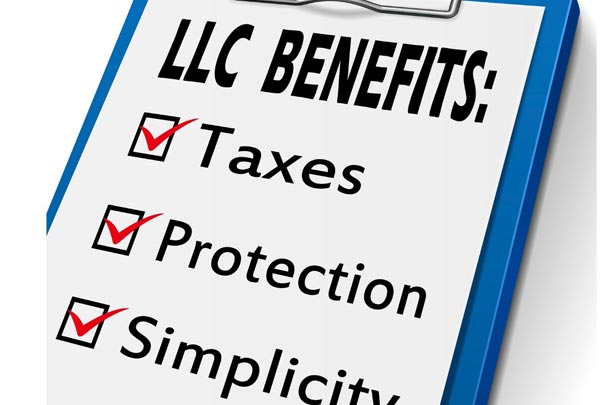Why do we need LLC’s?
Anyone who may be planning to begin a new business venture should be concerned with a few basic truths. One sad but very true fact is that our society is becoming more litigious every day. Even worse, more people are finding themselves on the wrong side of lawsuits. The experience of having to defend a legal action is both stressful and debilitating. The bottom line is, no one wants to be sued. There is a point to all of this. If you can put up a legal shield between you and creditors, then you should do it. The Limited Liability Company (LLC) is a complete, separate entity. None of the members of an LLC are personally liable for its debts, whether they arise in contract or tort.
Another truth is that our government is continuing to take even more from us in taxes, and this trend shows no signs of decline. So, the taxpayer has to be creative and should take advantage of every possible break. The LLC does not pay any tax itself (as opposed to corporations, which do pay taxes) and it qualifies for partnership tax status. Partnership tax rules are a lot more flexible, allowing the tax planner a definite advantage over other forms of doing business. Anyone concerned with tax liability should seriously take into consideration about doing business as a limited liability company.
Drafting the operating agreement is very important. This is because it has to comply with both state and IRS regulations so that the LLC will be taxed as a partnership and not as a corporation.
An LLC is a perfect vehicle should you desire to raise money for a real estate or venture capital project. Admitting new members is a simple process and there are no limits to the number of additional investors. They can include all types of individuals, corporations, trusts, pension plans and foreigners (both out of state and out of the country). This is not true in the case of the corporate structure, especially the subchapter S corporation.
If you would like more information regarding asset protection, trusts, family limited partnerships or the subject of this article please call or email our office.
The membership interests of an LLC have more protection. In both the U.S. and offshore jurisdictions with U.S. style LLC acts, a creditor of a partner in a partnership or a member of an LLC is entitled only to the charging order rather than being entitled to execute directly against partnership assets. What a charging order does is that it gives a creditor the right to receive any distribution that the owner of the interest would have received. A charging order is just a court document directing the managers of the LLC to divert distributions that would go from the debtor member to the creditor until the judgment is paid.
You may think that the charging order isn’t much protection. But, the economic rights to distributions are all the creditors will get. The creditor does not get management and voting rights that go along with the LLC membership interest, and the LLC’s managers determine if and when distributions are made. In some situations, distributions will not be made while, in others, distributions will be significantly delayed. A few tax professionals have the belief that the creditor can be taxed on the debtor member’s income regardless of whether or not the creditor receives any distributions with respect to the charging order. Although this belief is questionable, the uncertainty in this error can make a creditor who contemplates a charging order a little nervous about potential taxes. In fact, an LLC operating agreement could be drafted in such a way to cause a creditor with a charging order to be liable for taxes.
Therefore, the charging order is an unattractive remedy to most creditors. As a result, the prospect of a charging order may convince a creditor in a more reasonable settlement than might otherwise be possible. Shareholders of a corporation have little such leverage. Therefore, in addition to being a very important and useful business tool, an LLC can be an invaluable asset protection tool.
If you would like more information regarding asset protection, trusts, family limited partnerships or the subject of this article please call or email our office.

Limited Liability Company
-
LLC shareholder or member
- Why do we need LLC’s?
- The businesses that benefit from LLCs
- The basics of Limited Liability Companies (LLCs)
- Articles of Organization for Limited Liability Companies
- The advantages of Limited Liability Companies (LLCs)
- The differences between Limited Liability Companies/Limited Partnerships and Corporations
- LLC’s Part One – History
- LLC’s Part Two – Formation, Structure and Operating Agreement
- LLC’s Part Three – Membership Interests and Member Contributions
- LLC’s Part Four – Liability
- LLC’s Part Five – Records, Books and Taxation
- LLC’s Part Six – Centralized Management and Transferability of Interests
- LLC’s Part Seven – Continuity of Life, Withdrawal of Members and Dissolution
- Delaware Series Limited Liability Company
- Kentucky closes loopholes in limited liability companies
- Frequently asked questions about Limited Liability Companies (LLCs) – Part One
- Frequently asked questions about Limited Liability Companies (LLCs) – Part Two
- Frequently asked questions about Limited Liability Companies (LLCs) – Part Three
- Advantages of a Limited Liability Company
- Advantages of a Limited Liability Company (LLC) over a Limited Partnership
- Advantages of a Limited Liability Company (LLC) over an S Corporation
- Facts about Limited Liability Companies (LLCs)
- More frequently asked questions about Limited Liability Companies – Part One
- More frequently asked questions about Limited Liability Companies – Part Two
- More frequently asked questions about Limited Liability Companies – Part Three
- More frequently asked questions about Limited Liability Companies – Part Four
- More frequently asked questions about Limited Liability Companies – Part Five
newsletter signup
[forminator_form id=”1485″]

FIGHTING BACK!
